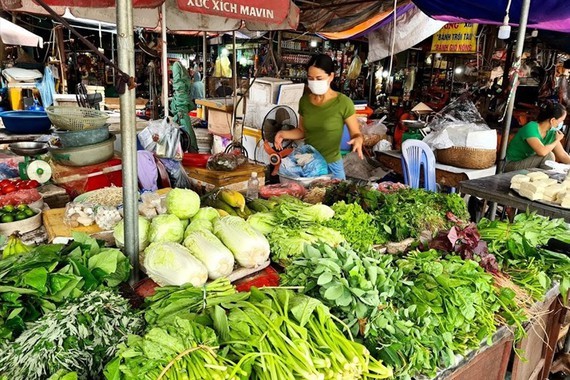 Restaurants and catering services increased by 0.67 percent, making the overall CPI gain by 0.22 percentage points in July. (Photo: SGGP)
Restaurants and catering services increased by 0.67 percent, making the overall CPI gain by 0.22 percentage points in July. (Photo: SGGP)
This is a significant increase within a month as the food and foodstuff prices rocketed when some localities implemented social distancing to prevent the Covid-19 pandemic, making people concerned about a shortage of goods, so they increased stockpiling.
Besides, the facts that gasoline and gas prices escalated following the global fuel prices and power prices climbed following rising domestic energy consumption in the hot season are the main reasons why CPI in July emerged by 0.62 percent compared to the previous month, 2.25 percent compared to December last year, and 2.64 percent compared to July last year.
However, for the first seven months of this year, CPI only rallied by 1.64 percent year-on-year, the lowest increase since 2016. Meanwhile, core inflation in the first seven months surged by 0.89 percent.
In the increase of 0.62 percent of CPI in July, seven groups of commodities and services posted surges, three posted decreases, and one kept stable prices. Transportation had the highest growth with 2.36 percent, causing the overall CPI to increase by 0.23 percentage points due to the impact of three adjustments in petrol and oil prices.
Housing and building materials increased by 0.88 percent, making CPI go up by 0.17 percentage points. Restaurants and catering services increased by 0.67 percent, making the overall CPI gain by 0.22 percentage points, as the need to hoard goods of people in some localities implementing social distancing suddenly soared, causing food and foodstuff prices to escalate.
Affected by the Covid-19 pandemic, culture, entertainment, and tourism slid 0.1 percent; prices of hotels and guest houses sank by 0.41 percent; besides, prices of ornamental plants and flowers plunged by 0.53 percent due to favorable weather. Post and telecommunications slipped 0.05 percent as the price of mobile phones decreased by 0.12 percent, and smartphone accessories and tablets fell by 1.77 percent. Garments, hats, and footwear retreated by 0.03 percent. Meanwhile, the group of other goods and services remained unchanged.
Besides, the facts that gasoline and gas prices escalated following the global fuel prices and power prices climbed following rising domestic energy consumption in the hot season are the main reasons why CPI in July emerged by 0.62 percent compared to the previous month, 2.25 percent compared to December last year, and 2.64 percent compared to July last year.
However, for the first seven months of this year, CPI only rallied by 1.64 percent year-on-year, the lowest increase since 2016. Meanwhile, core inflation in the first seven months surged by 0.89 percent.
In the increase of 0.62 percent of CPI in July, seven groups of commodities and services posted surges, three posted decreases, and one kept stable prices. Transportation had the highest growth with 2.36 percent, causing the overall CPI to increase by 0.23 percentage points due to the impact of three adjustments in petrol and oil prices.
Housing and building materials increased by 0.88 percent, making CPI go up by 0.17 percentage points. Restaurants and catering services increased by 0.67 percent, making the overall CPI gain by 0.22 percentage points, as the need to hoard goods of people in some localities implementing social distancing suddenly soared, causing food and foodstuff prices to escalate.
Affected by the Covid-19 pandemic, culture, entertainment, and tourism slid 0.1 percent; prices of hotels and guest houses sank by 0.41 percent; besides, prices of ornamental plants and flowers plunged by 0.53 percent due to favorable weather. Post and telecommunications slipped 0.05 percent as the price of mobile phones decreased by 0.12 percent, and smartphone accessories and tablets fell by 1.77 percent. Garments, hats, and footwear retreated by 0.03 percent. Meanwhile, the group of other goods and services remained unchanged.
























